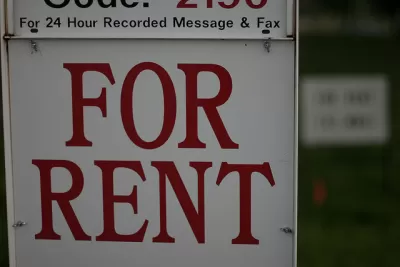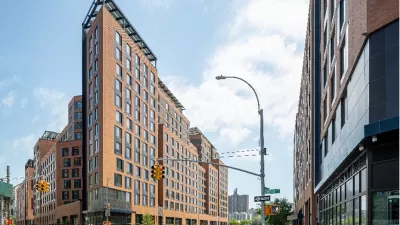With increasing pressure on the nation's supply of affordable housing, low- and middle-income renters are seeing their rents go up while higher-quality apartments drop prices to lure back remote workers.

Over the past year, while residents of high-rent downtowns reconsidered their housing options and high-income renters saw their rents decline, the opposite proved true for low-income renters, reports Catherine Rampell in the Washington Post.
"For well-off tenants, bargains abound. In most major metro areas, rents for high-end residential housing have plummeted, according to data from CoStar, a real-estate analytics company." In Dallas-Fort Worth, high-end apartments saw rents decline by one percent. Chicago saw a drop of 7.6%. Yet average rents on lower-end units ("older or lower-quality structures, with fewer amenities") have increased two percent in DFW and one percent in Chicago in the same time period. In isolated cases, rent went up as much as 40%. Already suffering more from the economic downturn, "low-income households are getting squeezed from both directions — less income and higher prices for what is usually their biggest single monthly expense."
The choice by many higher-income renters who "were already the marginal home buyer" to make the transition to homeownership during the pandemic, according to Jenny Schuetz of the Brookings Institution, has put downward pressure on high-rent apartments, many of which are being vacated by newly untethered remote workers. Combined with a slowdown in construction, this put pressure on landlords to reduce rents to entice new tenants and keep old ones. At the low end of the rental market, however, demand still far outstrips supply. The pandemic-induced "surge in demand for lower-price-point homes ended up bidding those rents higher." Some experts also call the rent increases an "unintended consequence of the federal eviction moratorium imposed last year," which may be incentivizing landlords to make up the lost income with higher rents on the tenants still paying. "Without a greater supply of affordable housing, the two-track pattern is likely to continue," deepening America's economic divide.
FULL STORY: Rents for the rich are plummeting. Rents for the poor are rising. Why?

Planetizen Federal Action Tracker
A weekly monitor of how Trump’s orders and actions are impacting planners and planning in America.

The Simple Legislative Tool Transforming Vacant Downtowns
In California, Michigan and Georgia, an easy win is bringing dollars — and delight — back to city centers.

San Francisco's School District Spent $105M To Build Affordable Housing for Teachers — And That's Just the Beginning
SFUSD joins a growing list of school districts using their land holdings to address housing affordability challenges faced by their own employees.

In More Metros Than You’d Think, Suburbs are Now More Expensive Than the City
If you're moving to the burbs to save on square footage, data shows you should think again.

The States Losing Rural Delivery Rooms at an Alarming Pace
In some states, as few as 9% of rural hospitals still deliver babies. As a result, rising pre-term births, no adequate pre-term care and "harrowing" close calls are a growing reality.

The Small South Asian Republic Going all in on EVs
Thanks to one simple policy change less than five years ago, 65% of new cars in this Himalayan country are now electric.
Urban Design for Planners 1: Software Tools
This six-course series explores essential urban design concepts using open source software and equips planners with the tools they need to participate fully in the urban design process.
Planning for Universal Design
Learn the tools for implementing Universal Design in planning regulations.
Smith Gee Studio
City of Charlotte
City of Camden Redevelopment Agency
City of Astoria
Transportation Research & Education Center (TREC) at Portland State University
US High Speed Rail Association
City of Camden Redevelopment Agency
Municipality of Princeton (NJ)





























